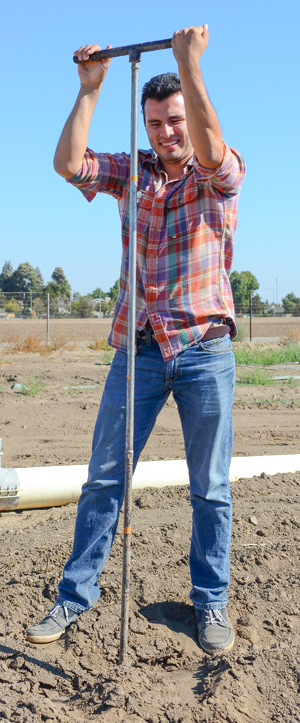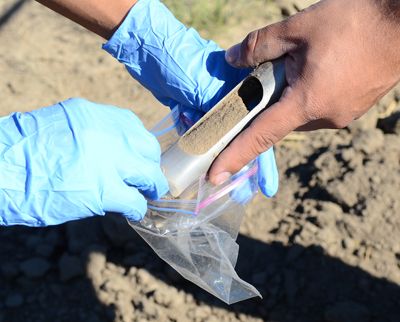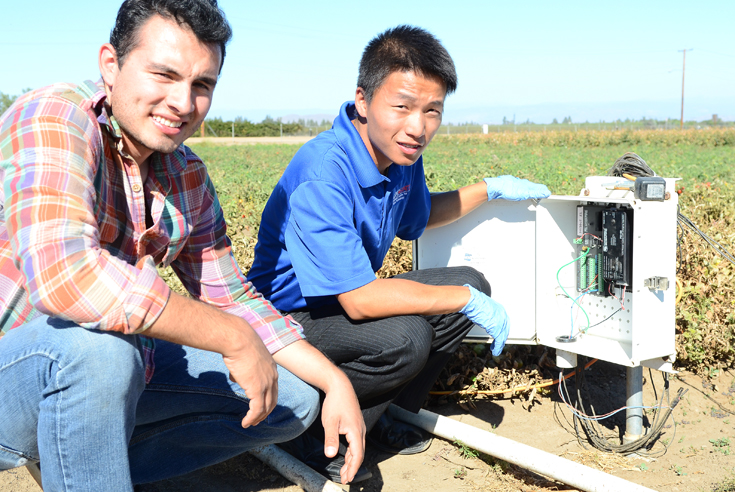California Agricultural Technology Institute
Responding to drought
Fresno State, industry partners to enhance irrigation, nitrogen use efficiency on University Agricultural Laboratory
A team of university water research specialists and irrigation industry partners has entered the second year of a three-year project to enhance Fresno State’s University Agricultural Laboratory (UAL) in the areas of water and nitrogen fertilizer use.

The UAL, commonly known as “the farm,” has long served as ground for educational and research studies aimed at improving crop quality, production and input efficiency, noted Dr. Florence Cassel Sharma, assistant plant science professor who is leading the project in collaboration with Associate Professor Dave Goorahoo and plant science graduate student Josue Samano.
“This 1,050-acre UAL is unmatched in the nation for providing students and faculty with a living laboratory that integrates basic sciences with applied research and production,” Cassel Sharma said. “Based on the myriad of crops grown, combined with our various irrigation systems, cultural and agronomic practices, the Fresno State Farm serves as a site typical of most San Joaquin Valley operations.”
 As such, the university farm is facing the same challenges growers are facing – especially
in the area of water use, Cassel Sharma noted. Groundwater levels for some campus
wells have dropped from 80 to 165 feet in recent years; some have gone dry altogether.
And one key well has been detected with rising nitrate levels.
As such, the university farm is facing the same challenges growers are facing – especially
in the area of water use, Cassel Sharma noted. Groundwater levels for some campus
wells have dropped from 80 to 165 feet in recent years; some have gone dry altogether.
And one key well has been detected with rising nitrate levels.
Cassel Sharma has led numerous research studies in recent years aimed at enhancing water use efficiency – on cooperating growers’ farms. This project will stay close to home, she said. “It is evident that future water supply will decrease for our farm and that a water management plan will need to be implemented to offset shortages in surface water and increased pumping costs for well water.”
(Above, plant science graduate student Josue Samano uses a probe to obtain a soil sample for moisture analysis. At right, sample is placed in plastic bag for transport to lab.)In cooperation with several regional irrigation equipment manufacturing companies, university researchers will focus on three campus enterprise fields – two vegetable and one orchard crop.
In year one of the project, completed in 2013-14, team members met with UAL personnel to compile and report water and nitrogen usage on these fields in an effort to assess water use efficiency (WUE) and nitrogen use efficiency (NUE), Cassel Sharma said.

At left, Josue and fellow plant science grad student Touyee Thao check a field data logger for soil moister sensors in tomato field.
“These data are being integrated into a GIS framework to assess the field water and nitrogen uses and start developing a water and nitrogen budget,” Cassel Sharma said. “As part of the first year of the project, a grant of more than $108,000 was secured from the California State University Agricultural Research Institute (ARI) for the UAL to purchase and install new irrigation pipelines on the farm, particularly for distribution of high-nitrate waters.”
To optimize crop management practices, the study will also focus on the existing equipment and infrastructure for monitoring and scheduling irrigation events; as well as soil sampling and monitoring at various times during the year.
In phase two of the project, methods and/or practices that can improve WUE and NUE will be proposed to the UAL staff, along with a timeline for implementation, Cassel Sharma said. This will include installation of monitoring devices and development of irrigation scheduling practices. Implementation and evaluation of activities and new practices will continue through 2016, with results to be disseminated following analysis of results.
Thus, the major goals of the project will focus on the improvement of water and nitrogen management strategies using advanced equipment and techniques, with the ultimate aim of improving crop yields while reducing production inputs, Goorahoo said.
For more information on the WUE aspects of the project, contact Cassel Sharma at fcasselss@csufresno.edu. For details on the NUE phase of the work, contact Goorahoo at dgooraho@csufresno.edu.